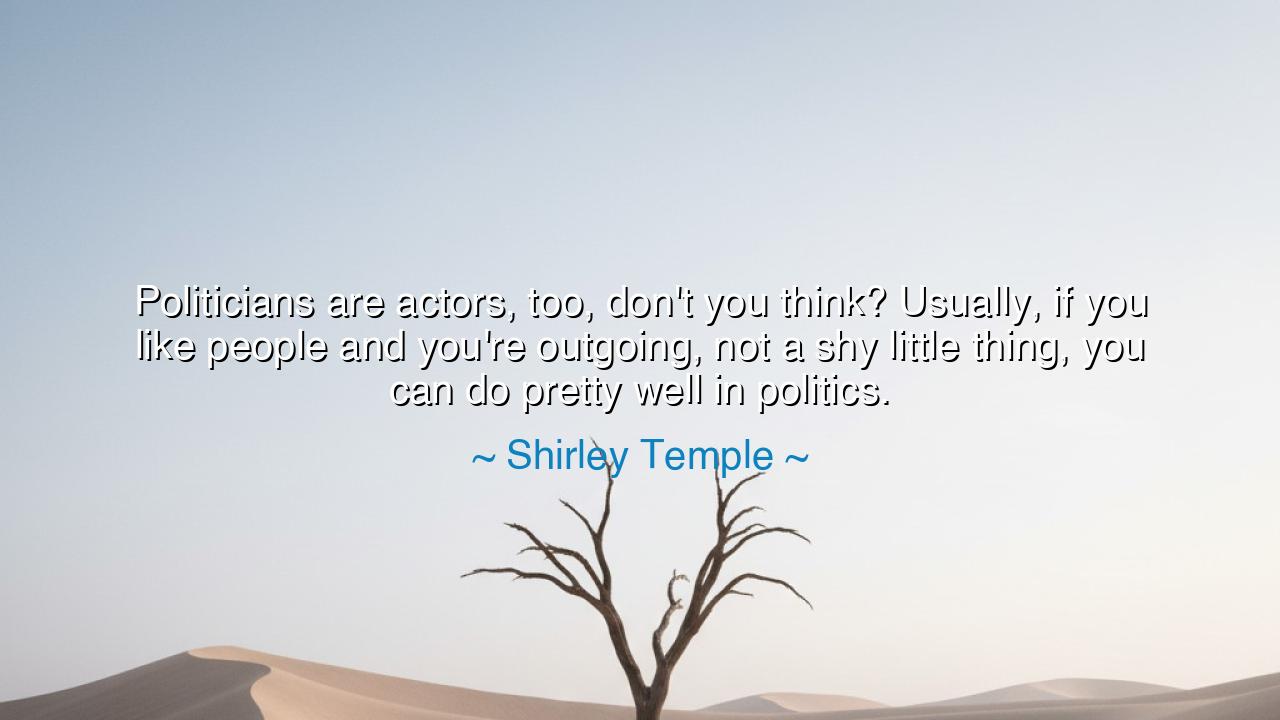
Politicians are actors, too, don't you think? Usually, if you
Politicians are actors, too, don't you think? Usually, if you like people and you're outgoing, not a shy little thing, you can do pretty well in politics.






Hear, O seekers of wisdom, the words of Shirley Temple, once the golden child of Hollywood and later a stateswoman of dignity: “Politicians are actors, too, don't you think? Usually, if you like people and you're outgoing, not a shy little thing, you can do pretty well in politics.” In this utterance, she unveiled the kinship between the stage and the halls of government, between performance and persuasion.
For what is politics if not a stage upon which men and women must perform? The politician, like the actor, must project confidence, embody roles, and sway hearts with words and gestures. To be successful, one must be outgoing, warm, and visible—not hidden or silent. In this sense, politics is not only the art of policy, but also the art of presence, of making people believe in your part in the drama of public life.
History bears witness. Consider Winston Churchill, who in his time of leadership was not merely a statesman but also a master orator, shaping his words like an actor delivering a script of destiny. His speeches—“We shall fight on the beaches”—were performances that lifted a nation from despair. Without this performative power, his politics might have faltered. Thus Temple’s wisdom holds: the politician must captivate, just as the actor must.
Yet her words also carry a warning. For performance alone cannot sustain governance. An actor may charm, but the statesman must also deliver. The stage of politics demands both charisma and substance, both the ability to shine before crowds and the courage to labor for the people’s good behind closed doors. To mistake the one for the other is to risk empty leadership, where applause is plenty but justice is scarce.
Therefore, let this wisdom endure: the line between actor and politician is thinner than many suppose. Both live in the gaze of others, both depend upon confidence and expression. But while the actor’s role ends when the curtain falls, the politician’s role continues in the fate of nations. Shirley Temple, who lived as both performer and diplomat, teaches us that charm may open doors, but true greatness is measured by what is done once the crowd’s applause fades.






THHoang Trung Hieu
I agree with Shirley Temple's perspective that charisma and being outgoing are key traits for a successful politician. But should we also be concerned that this emphasis on personal charm and public performance might overshadow the need for competency, experience, and a genuine commitment to public service? How do we navigate the line between electability based on personality and ensuring that politicians are truly qualified to lead?
QTDuong Quoc Thinh
Temple’s remark about outgoing politicians doing well raises an interesting point about the performative aspects of politics. It makes me think about how much influence charisma and likability have in swaying voters. Can we truly trust that these traits align with the ability to govern effectively, or do they sometimes distract from the real issues? How do we balance the appeal of a politician's personality with their actual political acumen?
BMLuong Bich Mong
Shirley Temple’s comment on politicians being actors taps into the reality that public perception often plays a larger role in politics than we might like to admit. If being outgoing and likable is key to political success, does this leave room for more introverted or policy-driven candidates to thrive? How can we level the playing field for different types of people who might be effective leaders but don't fit the 'actor' mold?
LNKhanh Linhhh Nguyen
I find Shirley Temple’s take on politics being about personality and performance rather than just policy quite thought-provoking. It seems to suggest that politics can sometimes be more about ‘selling’ yourself than about substance. Do you think this is why some politicians are more successful than others, even if they lack depth in their policy positions? How do we ensure that the focus shifts from performance to genuine leadership qualities?
NAThu Tran Ngoc Anh
Shirley Temple's observation about politicians being like actors is quite intriguing. It suggests that a politician's success might depend more on their ability to perform and engage with people than on their actual policies. But does this mean that the most charismatic or outgoing people make the best leaders? How important do you think personality and presentation are in politics compared to knowledge, experience, and integrity?